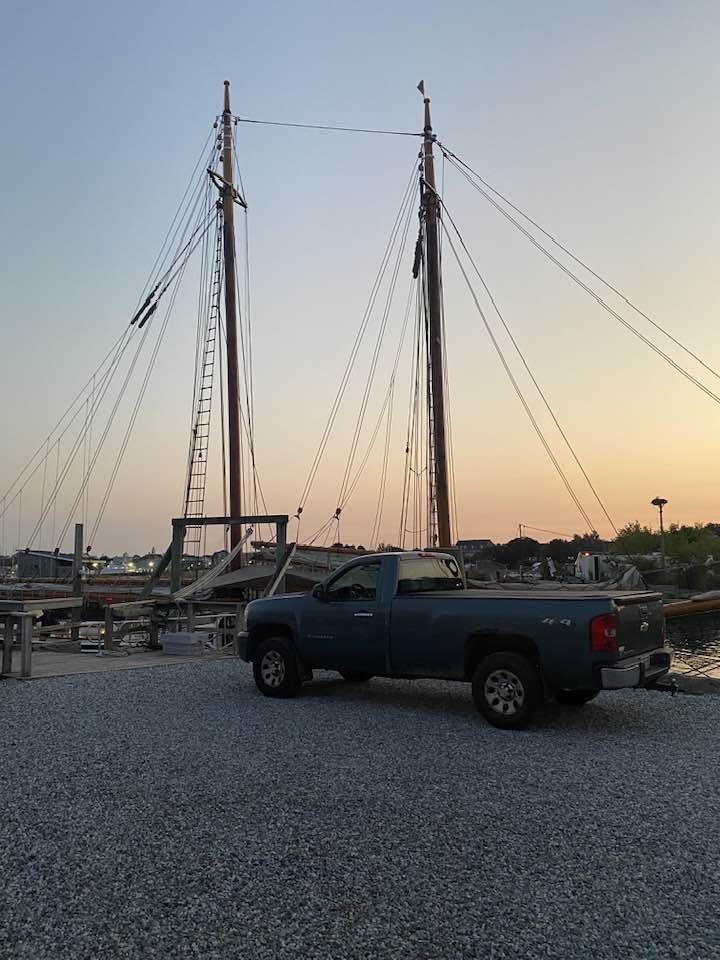A Yankee Notebook
NUMBER 2253
September 22, 2024
A Week on the Eagle
EAST MONTPELIER, VT – Bridget, the young Irish woman who lives in my dashboard, led us unerringly across the glacier-striated grain of New England for almost five hours and popped us out onto Main Street in Rockland, Maine, directly across from our favorite local seafood shack. Almost beside it, Front Street led steeply down to a set of piers where beautiful old-fashioned masts marked the berth of our home for the next four days.
The American Eagle was built in 1930, right on the cusp of the mechanization of the Gloucester fishing fleet, and packs a diesel engine (currently a John Deere, a comforting thought to this adoptive Vermonter) for use when the winds don’t cooperate. Ninety-two feet on deck, she accommodates 26 guests and operates with a six-person crew, including a five-star cook and cookee.
She was launched as the Andrew & Rosalie, after the first captain’s children, but underwent a major name change during the run-up to the Second World War, when German U-boats were busy among the Grand Banks fishing fleet. The United States wasn’t yet at war, so her fleet was still safe (sort of, barring mistakes) from torpedoes. Lest her maiden name be mistaken for that of a Canadian vessel (fair game), she was emblazoned with her current title, which rendered her technically safe until the United States declared war on the Axis, and they on us, in December of 1941.
Following the war, she resumed fishing, and brought in her last load in the summer of 1983. She was very tired. A Maine captain bought her, brought her down East, hauled her out, and went to work. Two years later she returned to work, carrying paying guests on sailing trips up and down the coast. As a retired carpenter, I love looking at every joint, every detail of her deck houses, even the beams over our bunk (one of which will knock you silly if you move incautiously anywhere near it).
I discovered her a few years ago while searching for an affordable alternative to a European barge cruise (Bea loves being on or in the water). We sailed in her two summers ago and sort of knew we’d come again. So here we were. We joined a small crowd of very friendly folks clustered around their SUVs with dunnage ready to go aboard. Several came over to introduce themselves. I picked up the honeyed accents of the American Deep South, and found myself hoping in a proprietary way that the coast of Maine (and the microscopic size of their cabins, which they’d have to share with all that luggage) wouldn’t disappoint them.
The captain addressed us all at six o’clock, and we dispersed for supper. Bea and I had been so taken two years ago with the seafood place above the pier that we hiked up, got in line, and were wowed once again by the efficiency, not to mention the food. Supper over, we shuffled back down the hill in the dark, climbed aboard, and settled into our cabin. There are only three of them on the ship with double beds. I signed up early enough for this trip that we got our old cabin back. It’s so small that only one of us at a time can put on their shoes; as we like to say, you have to go outside to change even your mind. But it beats the majority of cabins with upper and lower bunks. And we shared the head with only seven other people.
The Internet and cell phone service are really good out in Penobscot Bay, but so is any lack of need to keep in touch. The spruce-crowned islands flowed past almost like a dream; the sun sparkled on the waves; the wind filled the white sails; the bow wave rippled quietly past. In charge of nothing but my own behavior, I could lounge in either the sun or the shade of the sails, read or snooze in the cabin, or join (as Bea did) the lively conversations amidships. The situation defined idyllic.
In the afternoon we dropped anchor off the beach on Calderwood Island, ferried everyone ashore, steamed lobsters and sweet corn in a cauldron of rockweed, and feasted as our shadows lengthened across the beach. Bea hiked down to the shore, stripped to her bathing suit, and waded into the very chilly water. She’s an ocean swimmer and dips all through the summer. I watched her head far out, though there was nothing I could have done if it had disappeared. It didn’t.
The weather gods smiled as they rarely have done before. The morning after our fourth night in the cabin we bade fond adieus, loaded Erik the Red, and again put our fortunes into the hands of our disembodied Irish sweetheart for the five-hour trek westward across the rivers and mountains to the great state of Vermont and home.

The night before, in Rockland.

